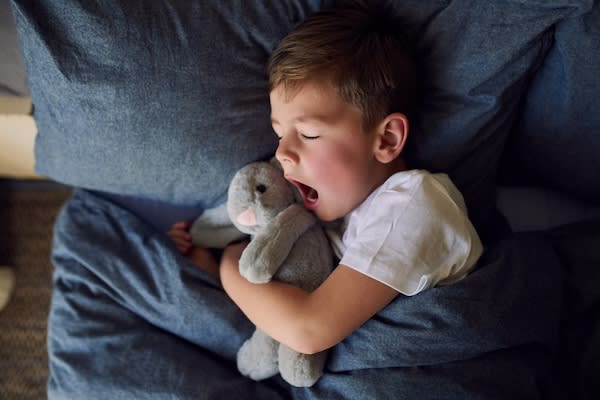
[3 MIN READ]
In this article:
-
Not getting enough sleep can harm a child’s health. That’s why it’s important to know how much sleep your child needs at every age.
-
When your child doesn’t get enough sleep on a regular basis, they may struggle with things like learning, memory and attention.
-
To help your child sleep better, try tips like avoiding caffeine, keeping screens out of the bedroom and making sure your child’s bedroom is cool and dark.
Expert sleep strategies for kids: Advice from a Providence pediatrician (and parent)
Parents tend to spend many of their waking hours thinking about sleep — wondering how much of it their kids need and lamenting the fact that, as adults, they aren’t getting more of it.
Not getting enough sleep is detrimental to adults’ health, but it’s especially harmful to children’s development.
Elizabeth Meade, M.D., a pediatrician and medical director of quality for pediatrics at Providence Swedish, wants to help your kids — and you, by association — catch more z’s.
How much sleep children need, by age
The first thing to know about kids and sleep is, of course, how much of it they need.
Here’s a breakdown of how much sleep the American Academy of Sleep Medicine (AASM) recommends depending on a child’s age:
Infants
12 to 16 hours, including naps
“The most important thing for infants is to help them learn the foundational sleep skills that will serve them throughout childhood and the rest of their life,” Dr. Meade says. “For babies, this means learning to build the skill of falling asleep on their own and going back to sleep on their own if they wake up in the middle of the night.”
Dr. Meade notes that formal sleep training isn’t recommended until a baby is somewhere between 4 months old and 5 months old, but she says you should connect with your child’s pediatrician if you have concerns about their sleep patterns.
Children ages 1-2
11 to 14 hours, including naps
Children ages 3-5
10 to 13 hours, including naps
Children ages 6-12
9 to 12 hours
“This is an age where social activities start to come into play,” Dr. Meade says. “Kids stay up later, they’ve got sports, they’ve got other things happening. Think about what time your child has to wake up for school and then work backward to see if they’re getting to bed on time to get nine to 12 hours of sleep.”
Dr. Meade adds that the more tired school-age children become when they aren’t getting enough sleep, the less they actually want to sleep. “It can really create a vicious cycle,” she says.
Teenagers (ages 13-18)
8 to 10 hours
Adolescents almost never get enough sleep, Dr. Meade says, which is why it’s a good idea to encourage them to get to bed whenever possible.
“If you have an option to start a little later in the morning, or have your child sleep as late in the morning as they can, that’s really helpful when it comes to teenage circadian rhythms,” she says.
The benefits of sleep
According to the AASM, getting enough sleep each night is linked to better health outcomes, including improved:
- Attention
- Behavior
- Emotional regulation
- Learning
- Memory
- Mental and physical health
- Quality of life
Similarly, not getting enough sleep on a regular basis can cause problems with:
- Attention
- Behavior
- Learning
It also increases the risk of:
- Accidents
- Depression
- Diabetes
- Hypertension (high blood pressure)
- Injuries
- Obesity
Better sleep tips
If your child struggles with falling asleep or staying asleep, there are ways you can help them sleep better, including:
- Avoiding scary movies, TV, video games and books right before bedtime
- Banning screens from the bedroom
- Establishing a bedtime routine, including brushing teeth and taking a warm bath
- Keeping the child’s bedroom cool and dark
- Prioritizing at least one hour of exercise during the day
- Staying away from caffeine
- Using white noise
If you’ve provided a healthy sleep environment for your child and they’re still having trouble — or they’re having trouble getting good sleep on a regular basis — talk with their pediatrician. They can help advise you on what’s causing your child’s sleep problems and how to help.
Contributing caregiver
Elizabeth Meade, M.D., is a pediatrician and medical director of quality for pediatrics at Providence Swedish.
Find a doctor
If you are looking for a pediatrician to help with your child’s sleep habits, including establishing a consistent bedtime routine and good sleep hygiene, you can search for one who’s right for you and your child using our provider directory.
Download the Providence app
It’s all in the app: easily stay connected with Providence and your health. With the Providence app, you can schedule appointments, have virtual visits from the comfort of your own home, get health recommendations personalized for you, access your health records and so much more. Learn more and download the app.
Related resources
How much sleep should kids get?
Do you know how screen time is affecting your kids’ sleep?
The importance of sleep and its connection to mental health
This information is not intended as a substitute for professional medical care. Always follow your health care professional’s instructions.
About the Author
More Content by Providence Children's Health Team





















